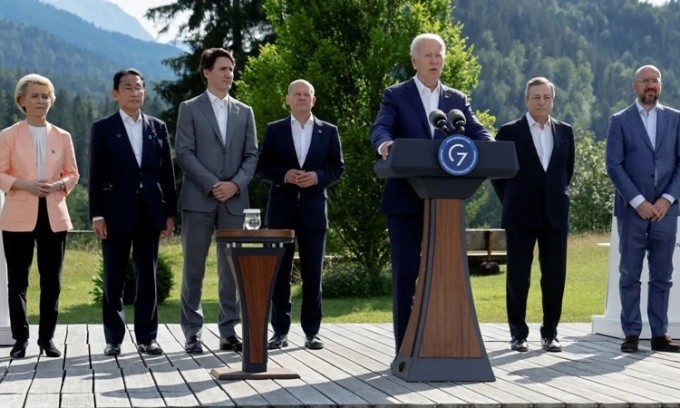(VOVWORLD) - The ongoing G7 Summit 2022 in Germany is drawing special attention from the international community. They are most concerned about solutions that the G7 leaders will adopt to cope with current security, economic, and diplomatic challenges globally.

G7 leaders at the G7 Summit 2022 in Germany (Photo: Reuters)
|
Opened on Sunday at Elmau Castle in Germany’s southern Bayern state, the 48th G7 summit convenes leaders from Germany, the UK, France, Italy, Japan, Canada, and the US and the Presidents of the European Commission and the European Council, the two top leaders of the EU. Host Germany also invited leaders from several other countries, including some members of the G20.
Notable agenda
Like many other countries, the G7 are facing their highest inflation in decades and a very real risk of economic recession. As the world’s strongest economies, they are under enormous pressure to address the problems. On the first day of the Summit, G7 leaders discussed possible responses. Japanese Prime Minister Kishida Fumio stressed the need to ensure economic security and asked the G7 countries to work together to protect their economies against price hikes.
The G7 leaders discussed energy security, food security, climate change response, digital transformation, and ways to coordinate their external relations policies to ensure global security, which they all agreed is being seriously challenged by the conflict in Ukraine.
Solutions
The G7 leaders and their partners agreed on a number of actions and solutions to cope with the current challenges. The G7 along with Argentina, India, Indonesia, Senegal, and South Africa agreed on common principles to strengthen the international order. In a statement released on Monday, the G7 and those 5 partner countries affirmed their determination to build resilience and promote equitable, inclusive, and sustainable solutions to global challenges. The G7 pledged to cooperate with their partners to promote peace and prosperity and achieve social progress to build an equitable world. They agreed to pursue peaceful solutions to conflicts and opposed any use of force, or threat to use force, in any form that is not in line with international law.
The G7 agreed to strengthen their response to climate change and their efforts to ensure energy security. Their leaders emphasized the goal of gradually reducing coal use and scaling up renewable energy, and adopted a 600-billion USD cooperation plan called “Partnership for Global Infrastructure and Investment (until 2027)”, which aims to counter the strong rise of China.
The success of these actions and solutions will depend on the determination and effort of every country. Many observers think the G7 should focus on the goal of “Progress toward an equitable world”, which Germany, the group’s rotating President, proposed earlier this year. To achieve that goal, Germany wants to strengthen the G7’s role as a mediator for global peace and security.